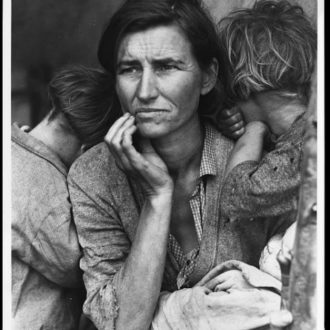
(Migrant Mother). Courtesy of Library of Congress, Prints & Photographs Division, FSA/OWI Collection.
The Great Depression and the Dust Bowl (a period of drought that destroyed millions of acres of farmland) forced white farmers to sell their farms and become migrant workers who traveled from farm to farm to pick fruit and other crops at starvation wages.1
Due to the lack of jobs during the Great Depression, more than 500,000 people of Mexican decent were deported or pressured to leave during the Mexican Repatriation, and the number of farm workers of Mexican descent decreased.2 Some estimate that as many as 1.8 million people were deported. Many of the people deported were U.S. citizens. The rational was that the resources and jobs should go to Whites rather than those of Mexican descent.
The U.S. government passed a series of labor laws to protect workers but excluded farm workers and domestic laborers. In 1935 the National Labor Relations Act (NLRA) provided the right to organize without retaliation but excluded farm workers and domestic workers.3 The 1938 Fair Labor Standards Act (FLSA) created overtime rules and established the minimum wage, which did not cover seasonal workers.4 The FLSA also failed to include youth farm workers in its standards for youth laborers.
Farm workers were excluded from labor laws in the 1930s, and they are still excluded from most basic labor protections available to workers in other industries. Learn more about farm workers by subscribing to our e-news and watch our video to better understand the continued ramifications of being excluded from most labor protections.
Sources:
- “Dust Bowl” History.com, Last modified August 5th, 2020, https://www.history.com/topics/great-depression/dust-bowl#:~:text=the%20Great%20Depression%3F-,Okie%20Migration,traveled%20west%20looking%20for%20wor
- Jasmine Aguirela, “Citizens Facing Deportation Isn’t New. Here’s What Happened When the U.S. Removed Mexican-Americans in the 1930s,” TIME, August 2, 2019, https://time.com/5638586/us-citizens-deportation-raids/
- Kaitlyn Henderson, “Why millions of workers in the US are denied basic protections,” OXFAM, November 20, 2020,
- Ibid.
